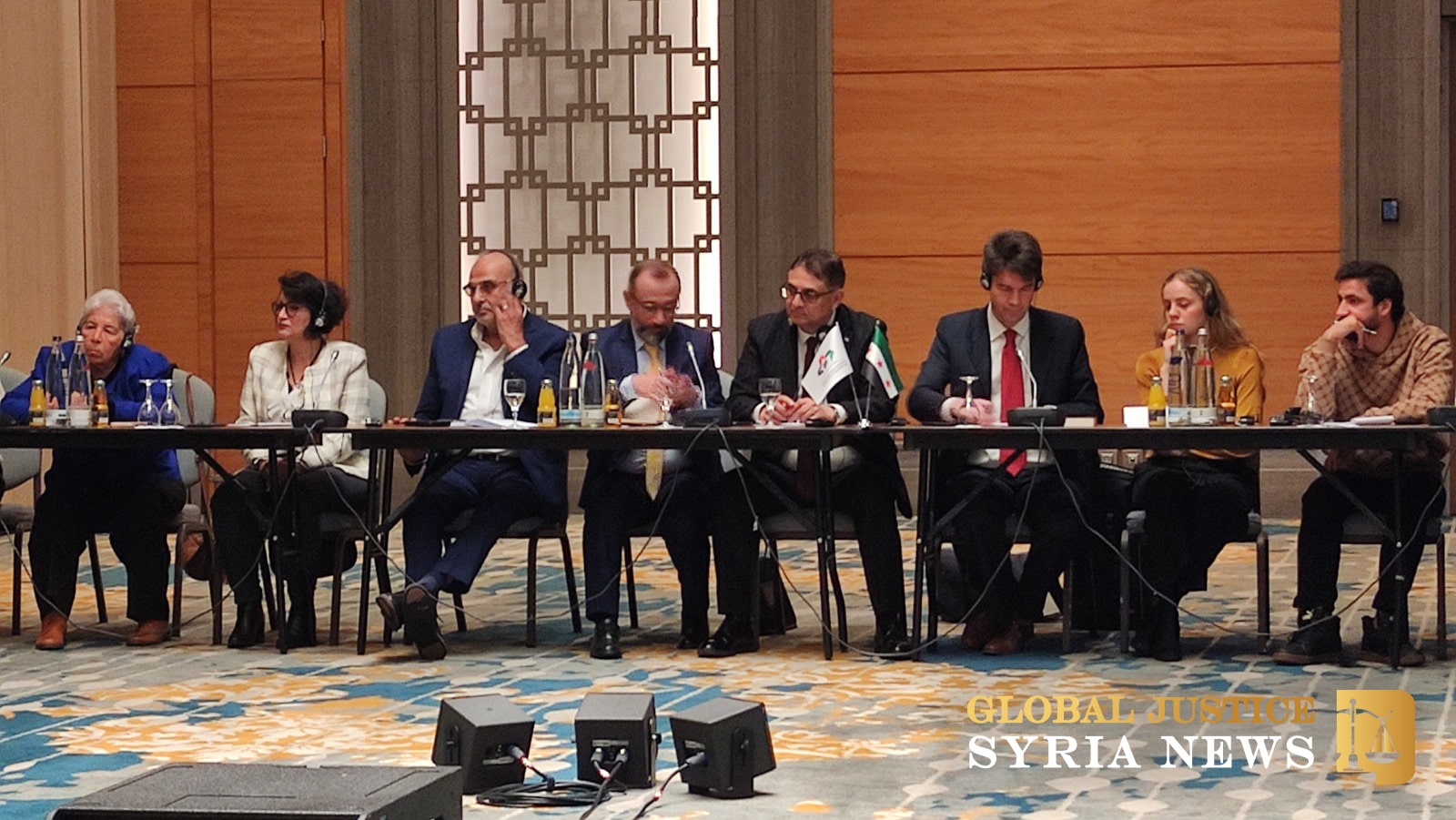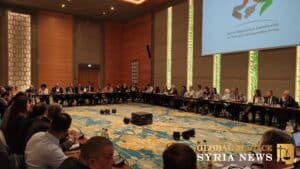Global Justice Syria News – Berlin:
German envoy to Syria, Ambassador Stefan Schneck, reassured Syrians who participated in the consultative meeting of the Syrian Negotiation Commission with Syrian civil society in Berlin, held on October 4-5, about Germany’s steadfast stance against normalizing relations with the Assad regime. He emphasized that such meetings are a crucial step towards achieving greater progress and consensus among Syrians through dialogue, reducing differences in approaches and viewpoints, and reaching common understandings.
During a two-day dialogue session organized by the Syrian Negotiation Commission with Syrian civil society last Friday in Berlin, attended by the head of the Syrian Negotiation Commission, Dr. Bader Jamous, and commission members Jamal Suleiman, Alice Mufrej, and Ibrahim Jabbawi, Ambassador Schneck reaffirmed that Germany is a partner of the Syrian opposition and the Syrian people and will remain so until a political solution is achieved in accordance with international resolutions.
Schneck emphasized that the European Union and the German government remain committed to the “three no’s” regarding Syria: no normalization with the Syrian regime, no lifting of sanctions, and no reconstruction efforts as long as the regime refuses to comply with the political solution under UN Resolution 2254. He made it clear that there will be no shifts in this position.
He also expressed Germany’s support for addressing all the effects of the Syrian war, including accountability and justice, and assured that the situation of Syrians in Germany is stable, with the majority having integrated into their new society. He pointed out that the different stance taken by some European countries on normalization represents individual positions and does not reflect the consensus within the European Union. He also noted that the Arab approaches in this regard have proven entirely ineffective.
Schneck highlighted Germany’s commitment to ensuring that humanitarian aid reaches all Syrians in need, with strict measures and transparency in place to ensure aid reaches northern Syria, though such controls are not present in regime-held areas. He stressed that this humanitarian aid, aimed at alleviating suffering, should not harm the political process, and reiterated that humanitarian aid is not a political solution; what is needed is a comprehensive political solution under Resolution 2254.
Dr. Bader Jamous, head of the Syrian Negotiation Commission, provided a comprehensive briefing on the commission’s political and negotiation tasks, its objectives, structure, and the main roles of its components, offices, and committees. He discussed the commission’s work at both international and local levels and the strategies that can be developed in collaboration with civil society groups and key actors.
Jamous also spoke about the commission’s relationships with influential countries, including Arab, regional, and international states, as well as its clear and firm stance on the political process under Resolution 2254 and other international decisions. He summarized the meetings held on the sidelines of the 79th session of the UN General Assembly last month and highlighted the importance of the commission’s partnerships with civil society organizations, political actors, media professionals, and research centers across various regions in Syria, including regime-controlled areas and in the diaspora, to formulate practical strategies that strengthen the Syrian cause on the international stage.
He touched upon the decline in international interest in the Syrian issue amid increasing global crises and domestic problems within states. He stressed the commission’s efforts to keep the Syrian political solution a priority for these nations and ensure the protection of refugee rights while warning against the risks and futility of normalizing ties with the Syrian regime.
Jamous emphasized the regime’s ongoing refusal to accept a political solution, including the implementation of Resolution 2254, and its attempt to marginalize the Syrian opposition in order to maintain its sole control of Syria. He noted the regime’s lack of belief in a political solution, seeking support from its allies and lenient states to marginalize all political solutions, including the constitutional committee and negotiations.
He also discussed the commission’s efforts to engage with civil society and unify visions and policies, as well as the ongoing work of the election committee and the involvement of many civil society experts in it. He mentioned the efforts of the detainees and forcibly disappeared committee to mobilize international efforts to release all Syrian detainees held in regime prisons and uncover the fate of those forcibly disappeared.
Ibrahim al-Jabin, editor-in-chief of Global Justice Syria News, represented Global Justice and the Syrian Independence Alliance (SIA) at the consultative meeting in Berlin. In his speech during the opening session, al-Jabin commented on Ambassador Schneck’s remarks, stating that the time had come for Germany to politically and civically listen to Syrians and work on freeing itself from the role it has been confined to — that of a benevolent supporter that has only provided refuge for Syrians. Instead, al-Jabin called for Germany to take a stronger political role in partnership with the Syrian opposition and Syrian civil society.
Al-Jabin noted some disappointment that had emerged from past meetings between Syrians and German officials regarding the future of Germany’s stance toward the Assad regime. He stressed that the Syrian diaspora in Germany has a clear position on Assad’s regime, and just as Germany maintains a special sensitivity toward anti-Semitism, as seen this year, it should be reminded that Assad’s regime is inherently Nazi in its structure, ideology, and practices. He added that the Assad regime, under Ba’ath Party rule since the 1960s, was the first to translate and distribute millions of copies of Adolf Hitler’s Mein Kampf. Therefore, Germany, which celebrates its unity this month, cannot place its hand in Assad’s, a regime convicted of war crimes, as doing so would deeply harm German values and ethics.
Al-Jabin further noted that the Syrian Negotiation Commission’s current focus on engaging with the Syrian diaspora indicates that the opposition is working to create Syrian lobbying groups in key countries that play a central role in the Syrian file. This work, he emphasized, should be developed on a scientific and precise level to be effective, and this is the meaningful and expected role of these institutions.
It’s worth noting that the Syrian Independence Alliance (SIA) is a coordination and cooperation network that extends from inside Syria to Turkey, Europe, and the U.S. It was launched at the beginning of September by an invitation from the Syrian American Initiative, represented by Global Justice, the Syrian Emergency Task Force (SETF), the Civilization of the Euphrates Organization in the U.S., the Syrian Road to Freedom and My Justice World organizations in Turkey, the Damascus Studies and Development Organization, the Syrian National Bloc, and the Syrian National Movement, along with the Arab Democratic Alliance and a number of organizations providing advisory and professional support in legal and specialized fields.




















